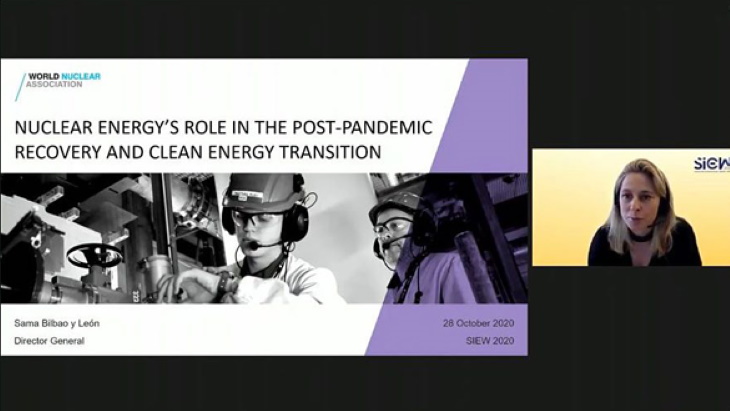Bilbao y León, who took over the helm of the association earlier this month, noted that in the year 2000 about 36% of the electricity supply globally was produced with low-carbon energy sources. In 2017, the percentage was about the same. This clearly shows that the steps we have taken so far towards clean energy have not helped achieve our decarbonisation objectives, she said during a 28 October presentation. "Despite the enormous investment we have made in variable renewable energy sources, we are still not making a dent."
Nuclear is currently the second largest source of low-carbon electricity generation worldwide. In order to meet climate change and sustainable development goals, we need to ensure there is an increase in nuclear power's share of the global energy mix, she said.
"The global coronavirus pandemic has had a huge economic impact. All countries in the world are looking very carefully at the policy responses needed to provide the opportunity to build a genuinely sustainable world," she said. "There is an opportunity to deploy in a cost-effective manner a low-carbon, resilient and affordable energy and electricity infrastructure."
Nuclear energy can play a central role in post-COVID recovery efforts, she said. "There is a window of opportunity for governments to invest in nuclear energy to address the immediate crisis caused by coronavirus, and to prevent future crises by dealing with bigger, chronic problems, such as climate change, air pollution and energy poverty. Investment in nuclear energy would therefore not only be socially responsible, but would also help to future-proof economies and societies by building towards a cleaner and more equitable future."
Investment in nuclear energy, she said, will also help strengthen world energy security and contribute to overall energy supply, including low-carbon heat and hydrogen, which will help decarbonise other sectors of the economy beyond electricity.
She noted that new nuclear capacity can be built very quickly, pointing to the trend seen in the 1970s and 1980s to illustrate this fact.
"This gives us hope that in this time when we really need to increase very quickly the generation that comes from low-carbon energy sources, nuclear is one of the options that we can use." However, she said we need to take full advantage of the existing fleet of nuclear power plants in order to have a "dove-tailing" into the new generation of plants. She noted the average capacity factor of all nuclear reactors in the global fleet is very high at above 80%, regardless of their age.
Bolstering electricity security
Achieving electricity and energy security needs "a long-term strategy that requires long-term planning at the national and international levels", she said, noting the three dimensions that characterise a secure source of electricity.
Firstly, the physical availability of generating capacity at all times. Secondly, the contribution of capacity to the smooth operation of the electricity system, even in the presence of sudden shifts in demand or changing meteorological conditions. Thirdly, the contribution of capacity to the stable economic behaviour of the electricity system.
Nuclear has an important role to play in a balanced energy system because nuclear power plants will provide reliable baseload electricity, she said. In addition, they can also work in a flexible manner and are "a clear example of resilient facilities".
At the system-level, a resilient low-carbon infrastructure requires a balanced and diversified power mix, she said. "This means different technologies need to be included in the system and all different technologies are going to have a very important role to play."
The cost of generating electricity with nuclear power plants has fallen, she said, as has the cost of generating power from renewable energy sources. However, she said the levelised cost of electricity (at the plant level) is no longer the only parameter that ought to be considered when developing an electricity system that not only has baseload electricity, but also variable electricity. "As we look forward, analysing what is the optimum energy system, the levelised cost of electricity needs to be complemented with the system cost."
"Each country will choose an energy mix most suitable for them, but I need to emphasise the importance of having a diverse energy mix," she said. "It is important for different countries to put together a long-term plan with different energy sources ... but you need to have a strong back-up of baseload low-carbon electricity."





_55401.png)
_23009.jpg)

_33392.jpg)






